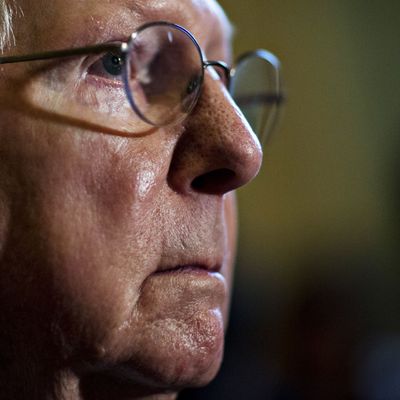
Remember those heady days after President Trump’s election, when the world was Republicans’ oyster and it seemed like Obamacare was irrevocably doomed? After seven years of railing against socialized medicine and voting to repeal the law dozens of times, the GOP would surely be ready with a coherent and cohesive plan to destroy it as soon as they had the chance. Right?
As that old rental-car commercial went, “Not exactly.” What follows is a narrative of the torturous path Republicans have navigated to get where they are today: nowhere.
(1) Pre-inauguration: Repeal before breakfast, worry about the details later.
President Trump urged a lightning-quick repeal of Obamacare — “long to me would be weeks,” he said — and House Speaker Paul Ryan and Senate Majority Leader Mitch McConnell seemed amenable to the idea. (McConnell: “The first step toward replacement is to repeal.”) But even then, the risks of undertaking such a bold strategy were clear, as the New York Times reported:
“This emerging “repeal and delay” strategy, which Speaker Paul D. Ryan discussed this week with Vice President-elect Mike Pence, underscores a growing recognition that replacing the health care law will be technically complicated and could be politically explosive.”
Nobody knew health care could be so complicated.
(2) January: Okay, fine, repeal the bill and replace it later.
While repeal-and-delay may have been the best on a menu of bad political options, insurers and others sounded the alarm: It would be a catastrophe for consumers. And when a handful of Senate Republicans started raising objections to the strategy — including conservatives like Bob Corker and Bill Cassidy — it became impossible to move forward. Lawmakers dropped talk of a “quick strike” and bowed to reality: “No one is talking about repealing anything until there is a concrete practical alternative to offer Americans in its place,” Senator Lamar Alexander said.
(3) April/May: Let the House write a far-right version, then change it.
The House’s health-care bill, briefly left for dead on account of its inhumanity, was resurrected like Frankenstein’s monster and given enough cosmetic tweaks to get to 217 votes.
To celebrate the half-passage of the law, the president staged a bizarre public celebration at the White House that will doubtless feature in every Democratic campaign ad for the foreseeable future, then called the bill “mean” in private — like the team player he is.
But Republican members of the upper house, even the folksiest conservatives, were skeptical. “Like y’all, I’m still waiting to see if it’s a boy or a girl,” said Senator Lindsey Graham. “Any bill that has been posted less than 24 hours, going to be debated three or four hours, not scored? Needs to be viewed with suspicion.”
(4) June/July: Actually, the House bill is mostly fine.
Never mind all that. The bill Mitch McConnell crafted in secret (in an unheard-of process for such major legislation) ended up looking a lot like the House’s version. The one major change he allowed, the Cruz amendment, was an effort to placate conservatives by allowing a single insurance pool for sick people — a move that drew terrible reviews from insurers and governors.
(5) Today: Back to square one.
The Senate bill — already facing pushback from both moderates and conservatives even before the Congressional Budget Office made its inevitably dire judgment on how many people would lose insurance as a result of it — officially died on Monday night when Senators Jerry Moran and Mike Lee announced their opposition on a motion to proceed.
So Senator McConnell, at the urging of President Trump, went back to plan A, which collapsed in a matter of hours.
(6) The future: ???
Mitch McConnell has a reputation for procedural wizardry, earned through his years of unprecedented and ultimately successful obstruction. But with a seemingly impossible needle to thread through his own caucus, McConnell might have hit a permanent roadblock on his dream to demolish the Affordable Care Act.
So what’s next? Maybe McConnell will personally go door to door around America, ripping up poor people’s Medicaid forms. Maybe he’ll invite the moderate caucus of the Senate to Kentucky for a little reprogramming.
Or maybe, just maybe, he’ll have to face his true nightmare, the grim possibility that has haunted his dreams for months:






























